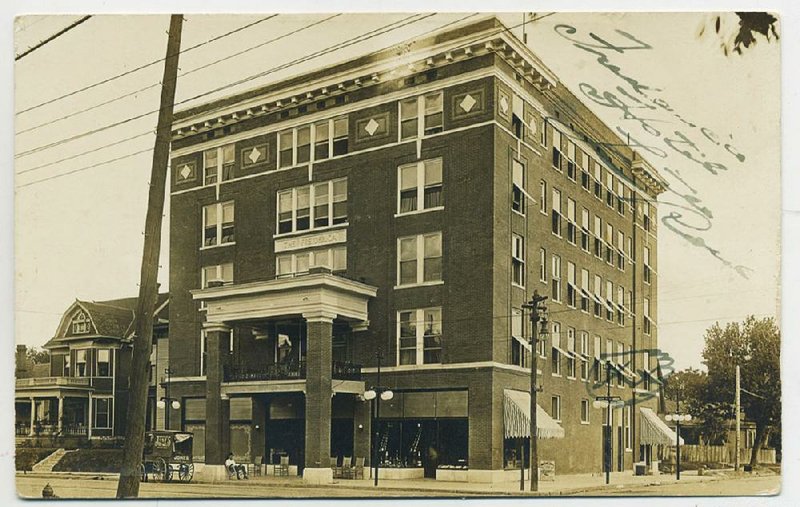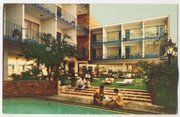At 102 years old, the Legacy Hotel in downtown Little Rock has had a lot of time to become both famous and infamous.
Little Rock had a population of about 50,000 in 1914 when the Hotel Freiderica opened at Fifth (later Capitol Avenue) and Gaines streets. It was built by Fred W. Allsopp, an Arkansas Gazette bookkeeper. The Gazette reported that the hotel's concrete-and-steel framework was completed in just 18 days, "a record-breaker for this section of the country."
Over the next few decades, a future Arkansas governor who was from one of the world's wealthiest families; a renowned architect; a host of famous reporters and actors; the patriarch of a legendary hotel family in New York; and 24 ordinary citizens caught up in the police raid of a toga party became cast members of the hotel's many acts.
The hotel has had local owners for most of its existence. It will stay that way after the Aug. 8 sale to five investors who will operate the hotel under Ascend Collections, the "boutique" brand of Choice Hotels International.
The grandparents of Little Rock restaurateur Capi Peck owned the hotel from 1938-72. She said the hotel -- the Hotel Sam Peck by then -- could be considered the city's first "boutique" inn. Sam and Henryetta Peck traveled the world, brought home antiques to give each room a distinct touch, and established the hotel's reputation for fine dining, with foods not widely available in Little Rock, Capi Peck said.
Capi Peck credits the hotel for her culinary and business success today at her Trio's restaurant and other ventures. "My grandparents lived there, and my father, Robert, was on duty, so to speak, every other night," she said. "I did pretty much every job there like switchboard operator, desk clerk and kitchen help," Peck said. "It was a neat way to grow up. You'd meet people from all over the world."
Seeing the hotel now is "like going into a home that you grew up in 30 or 40 years later and seeing all the changes," she said. "It's a little bittersweet, but I'm also happy that it's getting new life again."
A boutique revival
The new owners are millennials, and today boutique hotels are said to be popular with that generation, which is defined as people born between roughly 1980 and 2000.
Jitendra Patel, Ankur Desai, Parimal Patel, Bhavin Patel and Jamak LLC bought the hotel for $2.85 million from Amin Amarshi, who purchased it for $974,000 in 2001 when it was the Radisson Legacy Hotel. It had been closed since 1998. Amarshi and his wife, Naseem, a professor of pharmacy at the University of Arkansas for Medical Sciences, lived on the property for most of the 15 years.
The new owners plan about $5 million in renovations and a theme that will be determined after they meet with designers.
Kishan Patel, the hotel's new director of operations, said the group already has met with local preservationists. "We wanted to know early on what we could do and couldn't do and shouldn't do," Patel said last week on a hot day when he and the owners were working inside and outside the hotel. The hotel was placed on the National Register of Historic Places in 2003.
The group is still deciding what to name the hotel: Hotel Freiderica is a possibility, as is Hotel Sam Peck, if there are no legal obstacles.
The hotel will remain open, though closing one section or another might be needed as work progresses. A first stage will involve turning rooms in the back part of the hotel that had been converted into apartments back into one- and two-bedroom suites. In the meantime, a lot of paint, maintenance and air-conditioner repairs are needed, Kishan Patel said.
Gabe Holmstrom, executive director of the Downtown Little Rock Partnership, welcomed the new owners and praised their commitment to a historic building.
"This is great news for downtown Little Rock," Holmstrom said. "There are precious few of the old historic hotels in Little Rock, and we are thankful the new owners have taken an interest in preserving and restoring this one for public use. Projects like this one will build on the other improvements and renovations we have seen along Capitol Avenue in recent years."
International style
In 1941, Sam and Henryetta Peck hired a young architect, Edward Durell Stone, to design a sixth-floor penthouse suite and a five-story annex in an art deco or "international" style. A Fayetteville native, Stone lived in New York City, where he'd helped with the redesign of the main lobby and grand ballroom of the Waldorf Astoria Hotel.
The Sam Peck Hotel was Stone's first Arkansas project. He later designed the John F. Kennedy Center for Performing Arts in Washington, D.C., the "crown of arches" at the old Busch Stadium in St. Louis, and the University of Arkansas for Medical Sciences main hospital building.
The five-story annex included two suites for the Pecks. Henryetta took 512, with an east-facing balcony view of the Little Rock skyline, while Sam took over the more party-friendly 511. Those suites are still named for the Pecks.
Winthrop Rockefeller chose the Hotel Sam Peck as his first Arkansas home when he came here in June 1953 to visit a wartime buddy, Frank Newell, a Little Rock insurance executive. Rockefeller took over the sixth-floor suite (later divided into three suites). He lived there for nearly two years while building a ranch and home atop 900 acres of Petit Jean Mountain near Morrilton.
At a news conference shortly after his arrival, Rockefeller served up what may be one of the greatest understatements ever uttered in Arkansas: "Perhaps I can make some useful contribution when I learn about it." (In 1966, Rockefeller was elected governor -- the first Republican governor in Arkansas since Reconstruction. He won re-election in 1968. His various foundations and nonprofits have made donations into the hundreds of millions of dollars.)
Sam Peck died in 1967. Henryetta and their son, Robert, ran the hotel for five more years, then sold it to Herbert R. Weissberg, who owned and operated the Gramercy Park Hotel in New York City for more than 40 years.
Weissberg, who owned other landmark hotel properties across the nation, sent his son, Steven, to help manage the Sam Peck Hotel.
But Steven Weissberg did it long-distance: He attended the University of Arkansas at Fayetteville, commuting on weekends to Little Rock to work on the hotel's books or to check rooms for any needed repairs, he said Wednesday by telephone. He said he took courses in Fayetteville because they weren't offered at the University of Arkansas at Little Rock.
"I really enjoyed the hospitality, the hotel, some really good restaurants in Little Rock, and living on Markham Hill above the Fayetteville campus," he said. "There are a lot of good memories."
"Saturday Night Feverish"
Burt Reynolds stayed at the Hotel Sam Peck while shooting White Lightning, the 1973 film about a good old boy taking down a crooked sheriff. Cosmopolitan dispatched a writer, Gael Greene, to talk to Reynolds. She didn't like August in Arkansas, with its "stifling" heat and "mosquitoes as big as chickens."
"I found Reynolds in the hotel bar with a string of locals warming the bar stools and the imported movie talent cooling down after a day on the set," Greene wrote in Tales from a Life of Delicious Excess, her 2006 memoir of her 40-year career as the restaurant critic for New York magazine. "He was big as life, which is never as big as celluloid or fantasy, looking fresh-scrubbed and Saturday Night Feverish in a skintight striped body shirt open at the neck and lean black stretch pants ...
"Burt ordered a club sandwich, anointing it with ketchup, and sweetly tolerated a dozen interruptions from passing fans.
"'Don't you just want them to go away?'" I asked.
"He shrugged. 'I sat there for fifteen years while people reached across me to get someone else's autograph, asking me, 'Are you somebody, too?'"
Robinson raiders
A raid on a "toga party" at the Legacy on May 15, 1982, led by then-Pulaski County Sheriff Tommy Robinson provided notoriety that the hotel didn't need.
About midnight, Robinson and his deputies swarmed the Sam Peck Motel -- an open-air motor court designed by architect Stone and built in 1960 -- and arrested 10 women and 14 men, mostly on felony charges of promoting obscenity. A few were charged with misdemeanor possession of marijuana.
X-rated movies seized during the raid were later played at a hearing in municipal court, but technical issues forced the judge to halt the review. "The sheriff's copy played at what seemed to be at least twice the normal speed, sending the actors and actresses into fast-paced frenzied activity and making what little dialogue there was sound like chipmunks," a reporter wrote. A sheriff's deputy also had labeled the tapes as "Good Movie" numbers 1, 2, 3 and 4. Asked why by a defense attorney, the deputy said, "In my opinion, they were pretty good movies."
One guest, from Sherwood, was charged with terroristic threatening because, Robinson said, the man had put a $10,000 bounty on Robinson's head while fighting with deputies. "Tommy always did have a higher estimate of his worth than what other people did," John Wesley Hall Jr., a Little Rock defense lawyer for several of those arrested, said last week.
Hall's post-raid prediction that the felony charges would be reduced or dismissed proved true.
Robinson could claim one victory: A jury sided with him and his deputies in a federal lawsuit filed by 13 toga party defenders who claimed invasion of privacy and false arrest.
Robinson also parlayed his years as sheriff into a job as a three-term member of the U.S. House of Representatives, representing central Arkansas for six years.
Colorful characters
Before his face was on store-bought cake mixes, Duncan Hines was a pioneer restaurant-and-lodging critic. His 1940 edition of his book Lodging for a Night had this to say about the Sam Peck Hotel: "Small, not new, but recently renovated, proving once again that a hotel does not have to have thousands of rms. to make it hospitable and welcome. Homelike guest rms." Rooms with a private bath cost $3.
Hines' newspaper column, "An Adventure in Good Eating," recommended the hotel's baked scallops.
Perhaps L.J. Davis should have stuck with the baked scallops: his time at the hotel indirectly brought upon Arkansas the label of being "congenitally violent."
The New York writer arrived in Little Rock in February 1994, on assignment for the New Republic at the height of the Whitewater investigation. The Wall Street Journal editorial page on March 23, 1994, reported that Davis was returning to his room at the Legacy about 6:30 p.m. Feb. 13, "and the next thing he remembers is waking up face down on the floor, with his arm twisted under his body and a big lump on his head above his left ear. The room door was shut and locked. Nothing was missing except four 'significant' pages of his notebook that included a list of his sources in Little Rock."
The editorial concluded that Arkansas must be "a congenitally violent place, full of colorful characters with stories to tell, axes to grind and secrets of their own to protect." Conservative talk radio picked up on the theme.
Except -- as the Democrat-Gazette reported -- the hotel manager and bartender said Davis was in the hotel's bar throughout the four hours the Journal reported Davis as being unconscious. The bartender told the Democrat-Gazette he'd served Davis four to six martinis of straight gin.
Davis didn't write about the incident in his article for the New Republic and, in several interviews, tried to downplay it because he wasn't sure what happened. He said the Journal was wrong about his notes. They were simply torn, and he might have done that himself while stuffing the notebook into a shoulder bag, he said.
Davis later told the media critic for the Washington Post that four to six martinis are "no more than I drank on any other night in Little Rock."
SundayMonday Business on 08/28/2016





